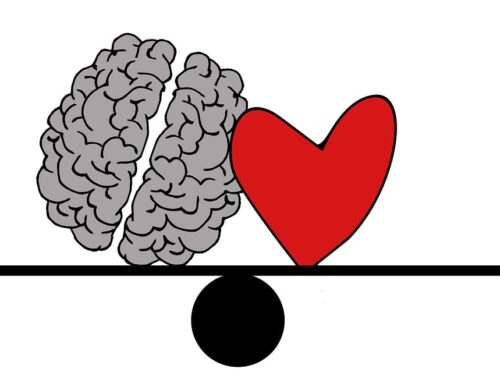Peeking Behind the Curtain: Why Your Therapist Keeps Some Things Private
Have you ever sat across from your therapist and wanted to know more about them? After all, here you are, pouring your heart out, and it’s only natural to wonder about the person nodding empathetically on the other side. I’ve been in those shoes, both as a therapist and a client, and have some insights on why it’s beneficial for that curtain to remain mostly drawn.
Why the Mystery?
Being a therapist is like being a guide that walks with you. Our primary goal is to help you navigate your feelings, thoughts and reactions. The path can get muddled when the guide starts sharing too much of their own journey. So how does personal detail muddle the process:
- Avoiding Bias: If a therapist shares too much about their experiences and how they tackled specific issues, it might unintentionally guide you down a path that worked for them. But remember, everyone’s journey is unique. Just because a particular approach or solution worked wonders for the therapist doesn’t mean it’ll be the perfect fit for you. Also, you may see them in a particular light, influenced by those bits they’ve shared. This can subtly shape how you interpret their feedback or even their reactions during sessions.
- Navigating Transference: Imagine your therapy sessions as a blank canvas. The less you know about your therapist, the more space there is for your own thoughts, feelings, and past experiences to take centre stage. Sometimes, we unknowingly project feelings or memories from our past onto people in our present. By keeping their personal stories to a minimum, therapists aim to be that neutral backdrop. This allows you to see where you might be “colouring” them with your own past experiences. Recognising these projections can be a light bulb moment where you realise you may be projecting the same thing onto other people. So, in the therapy, with a therapist you know very little about, you get the chance to unpack these feelings, understand them, and grow from them.
- Keeping It Professional: When you step into a therapist’s office, you’re not just looking for a casual chat as you’d have with a friend over coffee. You’re investing time, money, and trust in a professional who’s trained to guide, support, and understand you in ways that are therapeutic and transformative. Their expertise and ethical commitment ensure that the conversation remains beneficial, objective, and centred on your well-being.
- Maintaining Focus: Every minute is precious, and we want to ensure you get the most out of it. Take your therapy and your investment seriously. Focusing on you and not the therapist will ensure you get insights from your own path.
Knowing some things about your therapist
Sometimes, sharing a fact or story can make you feel closer to someone. In therapy, when a therapist shares a bit about themselves, it can feel good, making us feel seen and less alone. It’s like giving a sneak peek behind the curtain, showing that therapists are humans, too. But keeping the spotlight on you is the focus. So, knowing something personal about your therapist can be comforting and give us a relatable perspective and a balance of our relationship, but too much can overshadow the goal here. So, therapists tread carefully, always making sure their stories serve the client’s journey and not the other way around.
So things to keep in mind:
- The Curiosity is Real: I get it! You’re sharing some of your most intimate moments, and it’s only human to want to know more about the person listening. But diving deep into a therapist’s personal life can shift the focus away from your process.
-
- The Dynamics of Asking Personal Questions: When clients pop personal questions, because, well, we’re all a bit nosy, aren’t we? But it’s not always just out of curiosity. It can be about:
- Seeking Connection: wondering what your therapist’s favourite pizza topping or weekend hobbies are? It’s all about finding that connection. When clients feel they have something in common with their therapist, it’s like we’re on the same wavelength! It makes the therapy room feel a bit cosier. But trust in therapy isn’t about knowing if they prefer Cats or Dogs. It’s all about understanding, feeling heard, and that steady support. Trust in them grows over time with care and Connection.
- Testing the Waters: In the beginning stages of therapy, it’s like starting any new relationship. Some might test the waters to see how our therapist reacts. It’s our way of thinking, “Can I really trust this person?” When we get curious about our therapist’s latest Netflix binge or favourite holiday spot, it’s often just a way to see them as more human. It’s like trying to level the playing field so it doesn’t feel like one’s up in the clouds while the other’s on the ground. This whole “finding common ground” thing? It’s often about seeking a nod of understanding, hoping that maybe shared stories or laughs can pave the way for deeper connections and insights.
- Avoidance: When things get a bit too real or intense, we might change the subject or ask about the latest movie. In therapy, some clients might toss out personal questions as a “look over there!” tactic. It’s like a little detour when the emotional road gets bumpy. Asking our therapist’s personal questions takes the focus off us, giving ourselves a breather from diving into those tough feelings or memories.
- Transference: As I mentioned earlier, clients can project and see their therapist through a particular lens, coloured by their own feelings or past experiences. Like thinking, “My therapist reminds me of an old teacher from school!” They might toss out a personal question or two, checking if “Are you really like that teacher, or is it just my imagination?” The trouble with this is if we find out something that we think fits or doesn’t fit with the school teacher transference, we may unconsciously alter how we respond to our therapist. For example, if the teacher was critical, we might only show sides of ourselves that we think the therapist would approve of and try to please them.
Final thoughts: Therapy is a unique space, a blend of professional guidance and deep human Connection. While it’s natural to be curious about your therapist’s life, remember that the journey is about you. We’re here to support, guide, and walk alongside you, ensuring you have the tools and understanding to navigate life’s challenges. I encourage clients to discuss their feelings or curiosities with their therapist, allowing for an open conversation about boundaries and the goals of therapy.









